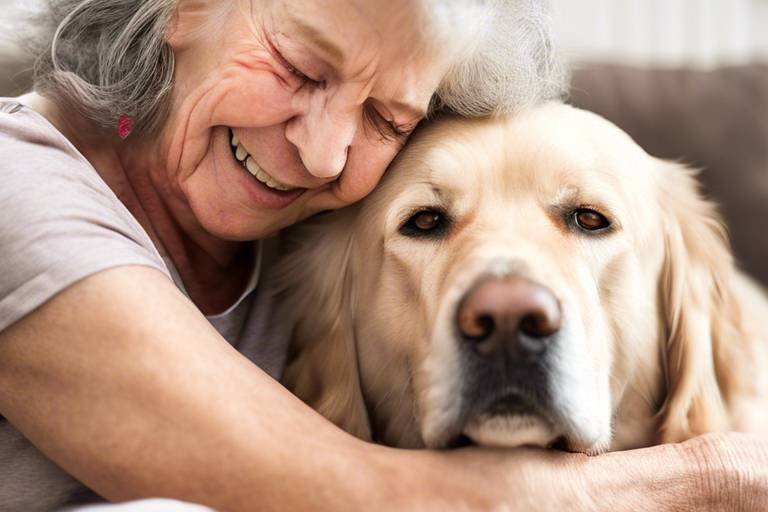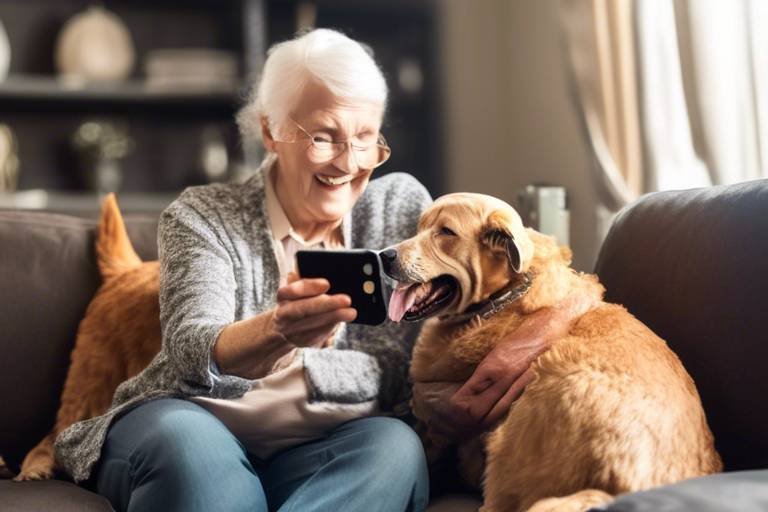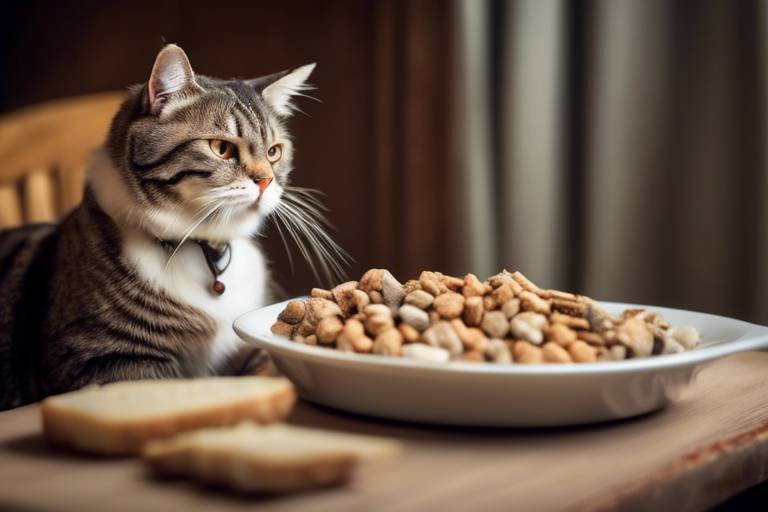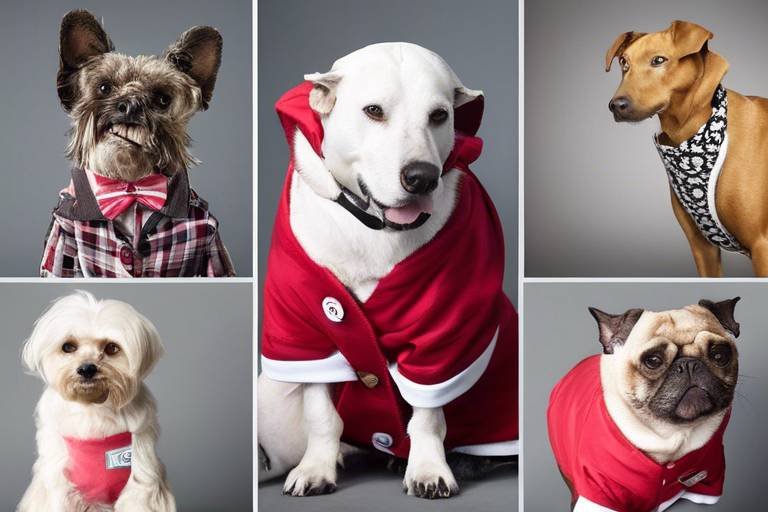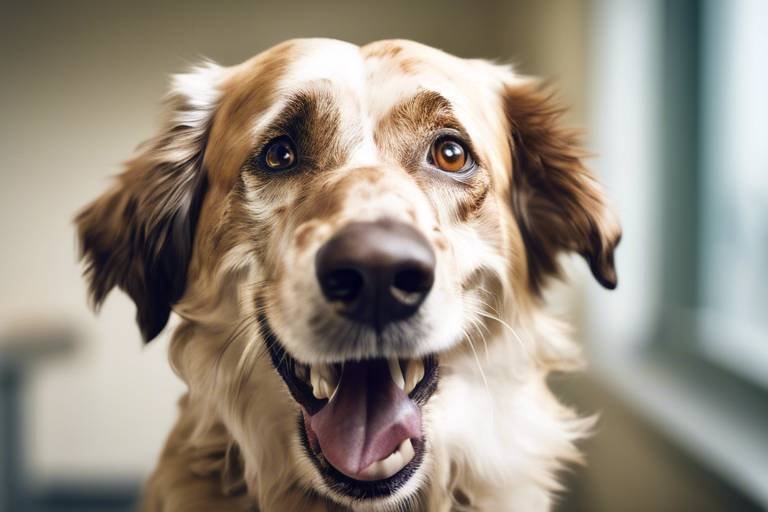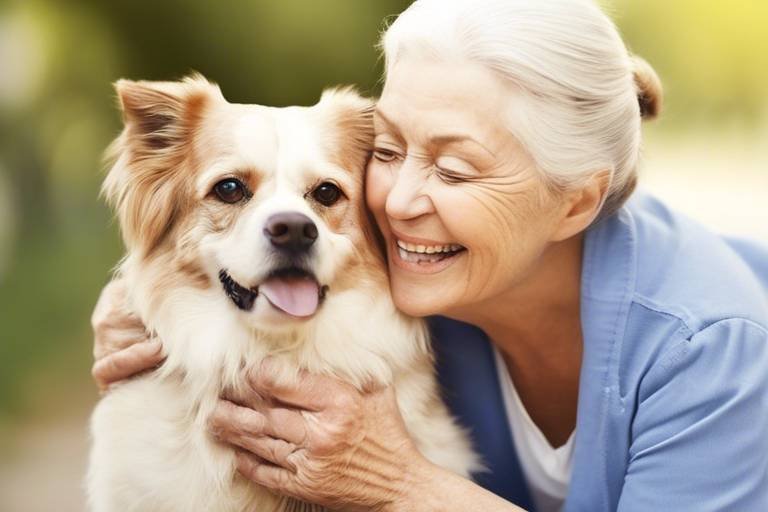Common Myths About Senior Pet Care
As pet owners, we often find ourselves navigating a maze of information, especially when it comes to caring for our beloved senior pets. There’s a myriad of misconceptions out there that can lead to confusion and even poor decision-making regarding their care. This article aims to debunk prevalent misconceptions surrounding the care of senior pets, highlighting the importance of proper understanding and compassionate treatment for our aging companions. After all, just like us, our furry friends deserve the best care possible as they enter their golden years.
Many believe that once pets reach a certain age, they no longer require frequent veterinary check-ups. However, this couldn't be further from the truth! Regular visits are crucial for early detection of health issues in senior pets. Just like we schedule annual check-ups as we age, our pets need the same attention. A routine examination can help identify potential problems before they become serious, allowing for timely intervention. Think of it as a preventive measure—just like getting a tune-up for your car to avoid breakdowns on the road!
It's a common misconception that senior pets cannot learn new tricks or commands. In reality, older animals can be trained effectively with patience and positive reinforcement techniques. Just because they may have a few gray hairs doesn't mean they're not capable of learning. In fact, training can be a fantastic way to keep their minds sharp and engaged. So, why not teach them a new trick? It could be as simple as learning to sit or even something more complex like fetching specific toys!
Training older pets can enhance their mental stimulation and strengthen the bond between pet and owner, making them more adaptable to changes in their environment. Engaging their minds helps prevent cognitive decline, which can be a concern in senior pets. It’s like giving them a mental workout—keeping their brains active can lead to a happier, healthier life!
Positive reinforcement is an effective method for training senior pets, as it encourages desired behaviors without causing stress or anxiety, fostering a positive learning experience. This technique involves rewarding your pet for good behavior, which can be as simple as a treat, praise, or a favorite toy. Imagine how much more motivated you would be to learn if you were rewarded for your efforts!
Adapting training techniques to suit the physical limitations of senior pets can lead to greater success, ensuring that they remain engaged and motivated throughout the process. For example, if your pet has trouble standing for long periods, consider training them while they are comfortably lying down. This not only makes the training process easier for them but also helps them feel more relaxed and willing to participate.
Recognizing signs of cognitive decline in senior pets is essential for providing appropriate care and support, as it can significantly affect their quality of life. Look for changes in behavior such as disorientation, disrupted sleep patterns, or a decrease in interest in activities they once enjoyed. If you notice these signs, it’s important to consult with your veterinarian for guidance and potential treatment options.
While older pets may be more prone to certain health issues, many senior animals can lead healthy, active lives with proper care, diet, and regular veterinary attention. It's vital to differentiate between age-related health concerns and the notion that all senior pets are sick. With the right support, many senior pets can enjoy their golden years with vitality and joy. Just like humans, some pets age gracefully without significant health problems!
Proper nutrition plays a vital role in maintaining the health of senior pets, ensuring they receive the necessary nutrients to support their aging bodies and overall well-being. A balanced diet tailored to their age and health status can help manage weight, support joint health, and maintain energy levels. Think of nutrition as the fuel that keeps their engines running smoothly!
Senior pets still require regular exercise to maintain their physical health and mental stimulation, but the type and intensity of exercise should be tailored to their individual capabilities. Short walks, gentle playtime, or even swimming can be excellent ways to keep them active without overexerting them. Remember, keeping them moving is key to preventing obesity and maintaining their overall health.
Contrary to popular belief, many senior pets still enjoy playtime and social interaction, which are essential for their emotional well-being and can help keep them active and engaged. Just because they may not be as spry as they once were doesn’t mean they don’t crave fun and companionship. Think of playtime as a way to bring joy into their lives, much like how we all enjoy a good laugh or a fun game!
Selecting appropriate toys for senior pets is important to ensure their safety and enjoyment, taking into consideration their physical limitations and preferences. Soft toys, puzzle feeders, or even gentle tug toys can provide hours of entertainment without risking injury. It's all about ensuring they have fun while keeping their safety in mind.
Engaging senior pets in interactive play can provide mental stimulation and exercise, fostering a joyful bond between pets and their owners while keeping them physically active. Activities like gentle fetch, hide-and-seek, or even training sessions can be fantastic ways to bond and keep them entertained. After all, a happy pet is a healthy pet!
- How often should I take my senior pet to the vet? Regular check-ups are recommended at least twice a year for senior pets.
- Can senior pets learn new tricks? Absolutely! With patience and positive reinforcement, senior pets can learn just as well as younger ones.
- What signs indicate my senior pet might be unwell? Look for changes in behavior, appetite, or energy levels, and consult your veterinarian if you notice anything unusual.
- Should I change my senior pet's diet? Yes, a diet formulated for senior pets can help meet their specific nutritional needs.

Myth 1: Senior Pets Don't Need Regular Vet Visits
It's a common belief that once our furry friends hit a certain age, they can coast through life without the need for those regular trips to the vet. But let me tell you, that couldn't be further from the truth! Just like us, senior pets face a host of health challenges as they age, and many of these issues can be subtle, creeping up on us without any obvious signs. Regular veterinary check-ups are essential for early detection and management of potential health problems. Think of it this way: would you ignore your own health just because you feel fine? Of course not! The same principle applies to our aging pets.
During these visits, veterinarians can perform essential health screenings that help identify issues such as dental disease, arthritis, or even more serious conditions like kidney disease or cancer. For senior pets, these check-ups should ideally occur at least twice a year. This frequency allows for monitoring changes in their health status and adjusting care as needed. It’s like having a personal trainer for your pet's health, ensuring they're in tip-top shape as they age.
Moreover, regular vet visits provide an opportunity for pet owners to ask questions and receive guidance on how to best care for their senior companions. This could include advice on nutrition, exercise, and even behavioral changes that may arise as pets grow older. Remember, your vet is not just a doctor; they are a partner in your pet's health journey.
Here are some key reasons why regular vet visits are crucial for senior pets:
- Early Detection: Many health issues are easier to treat when caught early.
- Tailored Health Plans: Your vet can create a personalized health plan that fits your pet's specific needs.
- Vaccinations: Keeping up with vaccinations is still important, even for older pets.
- Medication Management: If your pet is on medication, regular check-ups ensure they are receiving the correct dosages and that the medications are effective.
In conclusion, never underestimate the importance of those vet visits! They are not just a formality; they are a vital part of keeping your senior pet healthy and happy. So, make that appointment and give your beloved companion the care they deserve!

Myth 2: Older Pets Are Less Trainable
It's a common misconception that once pets reach their golden years, they become set in their ways and unable to learn new tricks or commands. This belief couldn't be further from the truth! In reality, older pets are not only capable of learning but can also thrive when given the right training environment. Just like us, they can adapt and grow, even as they age. Think of it this way: if you’ve ever tried to teach an old dog a new trick, you might have been surprised at how quickly they pick it up when motivated by love and treats!
Training senior pets can be a rewarding experience, both for the pet and the owner. It enhances mental stimulation, which is crucial for older animals, as it keeps their minds sharp and engaged. Plus, it strengthens the bond between you and your furry friend. Imagine the joy of seeing your pet learn a new command or trick; it’s like unlocking a new level in your relationship! The key here is patience and understanding. Older pets may take a little longer to grasp new concepts, but with consistent practice and encouragement, they can absolutely succeed.
Training your senior pet has multiple benefits that go beyond just learning commands. Here are a few:
- Mental Stimulation: Keeping their minds active helps prevent cognitive decline.
- Improved Behavior: Training can address behavioral issues that may arise with age.
- Increased Confidence: Successfully learning new tricks boosts their self-esteem.
- Enhanced Bonding: Training sessions can deepen your connection and understanding of each other.
One of the most effective methods for training senior pets is the use of positive reinforcement. This approach encourages desired behaviors by rewarding them with treats, praise, or playtime, rather than using punishment, which can lead to stress and anxiety. Imagine you’re at a party, and someone hands you a piece of cake every time you do a little dance; you’d likely keep dancing, wouldn’t you? The same principle applies to our pets. By celebrating their successes, no matter how small, we create a positive learning environment that encourages them to engage and participate.
As pets age, they may develop physical limitations that require us to adapt our training techniques. For instance, a senior dog might not be able to jump as high or run as fast as they once did. This is where creativity comes into play! You can modify commands or use different forms of exercise that suit their abilities. Instead of a lengthy fetch game, consider a gentle game of tug-of-war or hide-and-seek using their favorite toy. These adaptations not only keep them engaged but also ensure they feel included and valued in the training process.
Recognizing signs of cognitive decline in senior pets is essential for providing appropriate care and support. Symptoms may include confusion, disorientation, changes in sleep patterns, or increased anxiety. If you notice any of these signs, it’s crucial to consult with your veterinarian to discuss potential training adjustments and support strategies. Remember, a little extra understanding can go a long way in improving your pet’s quality of life.
Benefits of Training Senior Pets
This article aims to debunk prevalent misconceptions surrounding the care of senior pets, highlighting the importance of proper understanding and compassionate treatment for our aging companions.
Many believe that once pets reach a certain age, they no longer require frequent veterinary check-ups. However, regular visits are crucial for early detection of health issues in senior pets.
It's a common misconception that senior pets cannot learn new tricks or commands. In reality, older animals can be trained effectively with patience and positive reinforcement techniques.
Training senior pets is not just about teaching them new commands; it’s a gateway to enhancing their quality of life. Just like humans, pets thrive on mental stimulation and engagement. When you invest time in training your older furry friends, you’re not only keeping their minds sharp but also strengthening the bond you share. This connection is vital as it fosters trust and understanding between you and your pet.
Moreover, training can significantly reduce behavioral problems that might arise due to anxiety or boredom. For instance, an older dog that learns to sit or stay can enjoy more freedom in safe environments, which can lead to a happier, more fulfilling life. Imagine the joy of seeing your pet respond to commands, their tail wagging with excitement! It’s a rewarding experience for both of you.
Additionally, training sessions can serve as a form of exercise, helping to keep your senior pet physically active. Just like us, pets need to stay fit, and engaging them in light training can be a fun way to achieve that. The key is to keep the sessions short and enjoyable, ensuring that your pet doesn’t feel overwhelmed.
In summary, the benefits of training senior pets include:
- Mental Stimulation: Keeps their minds active and engaged.
- Strengthened Bond: Enhances the relationship between pet and owner.
- Behavioral Improvement: Reduces anxiety and boredom-related issues.
- Physical Activity: Provides gentle exercise tailored to their abilities.
Positive reinforcement is an effective method for training senior pets, as it encourages desired behaviors without causing stress or anxiety, fostering a positive learning experience.
Adapting training techniques to suit the physical limitations of senior pets can lead to greater success, ensuring that they remain engaged and motivated throughout the process.
Recognizing signs of cognitive decline in senior pets is essential for providing appropriate care and support, as it can significantly affect their quality of life.
While older pets may be more prone to certain health issues, many senior animals can lead healthy, active lives with proper care, diet, and regular veterinary attention.
Proper nutrition plays a vital role in maintaining the health of senior pets, ensuring they receive the necessary nutrients to support their aging bodies and overall well-being.
Senior pets still require regular exercise to maintain their physical health and mental stimulation, but the type and intensity of exercise should be tailored to their individual capabilities.
Contrary to popular belief, many senior pets still enjoy playtime and social interaction, which are essential for their emotional well-being and can help keep them active and engaged.
Selecting appropriate toys for senior pets is important to ensure their safety and enjoyment, taking into consideration their physical limitations and preferences.
Engaging senior pets in interactive play can provide mental stimulation and exercise, fostering a joyful bond between pets and their owners while keeping them physically active.
Q1: How often should I take my senior pet to the vet?
A1: It's recommended to take senior pets to the vet at least twice a year for check-ups, as they are more susceptible to health issues.
Q2: Can senior pets still learn new tricks?
A2: Absolutely! With patience and positive reinforcement, senior pets can learn new commands and tricks.
Q3: What kind of diet is best for senior pets?
A3: A balanced diet tailored for senior pets, which includes high-quality protein and essential nutrients, is crucial for their health.
Q4: How much exercise do senior pets need?
A4: Senior pets require regular, gentle exercise, which can be adjusted based on their physical capabilities and health status.
Using Positive Reinforcement
This article aims to debunk prevalent misconceptions surrounding the care of senior pets, highlighting the importance of proper understanding and compassionate treatment for our aging companions.
Many believe that once pets reach a certain age, they no longer require frequent veterinary check-ups. However, regular visits are crucial for early detection of health issues in senior pets.
It's a common misconception that senior pets cannot learn new tricks or commands. In reality, older animals can be trained effectively with patience and positive reinforcement techniques.
Training older pets can enhance their mental stimulation and strengthen the bond between pet and owner, making them more adaptable to changes in their environment.
Positive reinforcement is a powerful tool in the training arsenal for senior pets. This method focuses on rewarding desired behaviors rather than punishing unwanted ones. Imagine this: your senior dog sits patiently, and instead of scolding for not performing a trick, you shower them with praise and treats for simply being calm. This approach not only makes learning enjoyable for your furry friend but also builds their confidence.
When employing positive reinforcement, it’s essential to understand what motivates your senior pet. Whether it’s a tasty treat, a favorite toy, or even a gentle scratch behind the ears, recognizing these motivators can make all the difference. For example:
- Treats: Small, healthy snacks can be a great incentive.
- Affection: Some pets thrive on love and attention as their reward.
- Playtime: Incorporating their favorite game as a reward can be highly effective.
Furthermore, timing is crucial. Rewards should be given immediately following the desired behavior so that your pet can make the connection between the action and the reward. This creates a positive feedback loop that encourages them to repeat the behavior. For instance, if your dog sits on command, give them a treat right away. Over time, they’ll start associating sitting with receiving something they love.
Another key aspect of positive reinforcement is consistency. Just like humans, pets thrive on routine. If you consistently reward your senior pet for good behavior, they’ll be more likely to repeat it. This consistency helps establish clear expectations and reduces confusion, making the learning process smoother.
Lastly, keep in mind that patience is paramount. Older pets may take a bit longer to learn new tricks, but with a gentle approach and unwavering encouragement, they can absolutely succeed. Remember, the goal isn’t just to teach them commands; it’s about enriching their lives and strengthening your bond.
Adapting training techniques to suit the physical limitations of senior pets can lead to greater success, ensuring that they remain engaged and motivated throughout the process.
Recognizing signs of cognitive decline in senior pets is essential for providing appropriate care and support, as it can significantly affect their quality of life.
While older pets may be more prone to certain health issues, many senior animals can lead healthy, active lives with proper care, diet, and regular veterinary attention.
Proper nutrition plays a vital role in maintaining the health of senior pets, ensuring they receive the necessary nutrients to support their aging bodies and overall well-being.
Senior pets still require regular exercise to maintain their physical health and mental stimulation, but the type and intensity of exercise should be tailored to their individual capabilities.
Contrary to popular belief, many senior pets still enjoy playtime and social interaction, which are essential for their emotional well-being and can help keep them active and engaged.
Selecting appropriate toys for senior pets is important to ensure their safety and enjoyment, taking into consideration their physical limitations and preferences.
Engaging senior pets in interactive play can provide mental stimulation and exercise, fostering a joyful bond between pets and their owners while keeping them physically active.
Q: How often should I take my senior pet to the vet?
A: It's recommended to take senior pets for check-ups at least twice a year to monitor their health closely.
Q: Can senior pets learn new tricks?
A: Absolutely! With patience and positive reinforcement, senior pets can learn new commands and tricks.
Q: What kind of diet should I provide for my senior pet?
A: A balanced diet that caters to their specific health needs is vital. Consult your vet for tailored advice.
Q: How much exercise does a senior pet need?
A: Senior pets need regular, moderate exercise tailored to their abilities, such as short walks or gentle play sessions.
Adapting Training Techniques
This article aims to debunk prevalent misconceptions surrounding the care of senior pets, highlighting the importance of proper understanding and compassionate treatment for our aging companions.
Many believe that once pets reach a certain age, they no longer require frequent veterinary check-ups. However, regular visits are crucial for early detection of health issues in senior pets.
It's a common misconception that senior pets cannot learn new tricks or commands. In reality, older animals can be trained effectively with patience and positive reinforcement techniques.
Training older pets can enhance their mental stimulation and strengthen the bond between pet and owner, making them more adaptable to changes in their environment.
Positive reinforcement is an effective method for training senior pets, as it encourages desired behaviors without causing stress or anxiety, fostering a positive learning experience.
When it comes to training senior pets, adapting techniques to their unique needs is essential. Just like us, our furry companions age and may face physical limitations that affect their ability to learn. For instance, a senior dog might not be able to jump or run as swiftly as they used to. Therefore, it's important to modify your training methods to accommodate these changes. Here are some strategies to consider:
- Shorter Training Sessions: Keep training sessions brief, around 5-10 minutes, to prevent fatigue and keep your pet engaged.
- Use of Low-Impact Commands: Focus on commands that require less physical exertion, like "sit," "stay," or "come," rather than more demanding tasks.
- Frequent Breaks: Allow for regular breaks during training to let your pet rest and recharge.
- Comfortable Environment: Train in a familiar and comfortable space to reduce anxiety and promote a sense of security.
Additionally, using visual cues or hand signals can be particularly helpful, as some senior pets may have diminished hearing. Remember, the goal is to create a supportive atmosphere that encourages learning while respecting their physical capabilities. By adapting your training techniques, you can ensure that your senior pet remains engaged and motivated throughout the process.
Recognizing signs of cognitive decline in senior pets is essential for providing appropriate care and support, as it can significantly affect their quality of life.
While older pets may be more prone to certain health issues, many senior animals can lead healthy, active lives with proper care, diet, and regular veterinary attention.
Proper nutrition plays a vital role in maintaining the health of senior pets, ensuring they receive the necessary nutrients to support their aging bodies and overall well-being.
Senior pets still require regular exercise to maintain their physical health and mental stimulation, but the type and intensity of exercise should be tailored to their individual capabilities.
Contrary to popular belief, many senior pets still enjoy playtime and social interaction, which are essential for their emotional well-being and can help keep them active and engaged.
Selecting appropriate toys for senior pets is important to ensure their safety and enjoyment, taking into consideration their physical limitations and preferences.
Engaging senior pets in interactive play can provide mental stimulation and exercise, fostering a joyful bond between pets and their owners while keeping them physically active.
Q: How often should I take my senior pet to the vet?
A: It's recommended to take senior pets to the vet at least twice a year for regular check-ups, as they are more susceptible to health issues.
Q: Can I still train my senior pet?
A: Absolutely! With the right techniques and patience, senior pets can learn new commands and tricks just like younger ones.
Q: What should I feed my senior pet?
A: Consult your vet for dietary recommendations, but generally, senior pets benefit from a diet rich in nutrients tailored to their age-related needs.
Q: How much exercise does my senior pet need?
A: Senior pets still need regular exercise, but it should be adjusted to their physical capabilities. Short, gentle walks and playtime are great options.
Signs of Cognitive Decline
This article aims to debunk prevalent misconceptions surrounding the care of senior pets, highlighting the importance of proper understanding and compassionate treatment for our aging companions.
Many believe that once pets reach a certain age, they no longer require frequent veterinary check-ups. However, regular visits are crucial for early detection of health issues in senior pets.
It's a common misconception that senior pets cannot learn new tricks or commands. In reality, older animals can be trained effectively with patience and positive reinforcement techniques.
Training older pets can enhance their mental stimulation and strengthen the bond between pet and owner, making them more adaptable to changes in their environment.
Positive reinforcement is an effective method for training senior pets, as it encourages desired behaviors without causing stress or anxiety, fostering a positive learning experience.
Adapting training techniques to suit the physical limitations of senior pets can lead to greater success, ensuring that they remain engaged and motivated throughout the process.
Recognizing signs of cognitive decline in senior pets is essential for providing appropriate care and support, as it can significantly affect their quality of life. Just like humans, our furry friends can experience a decline in cognitive function as they age, which may manifest in various ways. You might notice your pet becoming forgetful, seeming confused in familiar environments, or showing changes in their sleeping patterns.
Some common indicators of cognitive decline include:
- Disorientation: Your pet may appear lost in familiar places or have difficulty finding their way around the house.
- Changes in Sleeping Patterns: Senior pets may sleep more during the day and become restless at night.
- Altered Interaction: If your pet is less responsive to commands or seems indifferent to your presence, it could be a sign of cognitive decline.
- Increased Anxiety: Noticeable anxiety or agitation, especially in new situations, can indicate cognitive issues.
- House Training Issues: If your previously house-trained pet starts having accidents indoors, it might be due to cognitive decline.
It's important to keep an eye out for these signs. Early detection can lead to better management of your pet's condition, allowing for a more comfortable and fulfilling life. Regular consultations with your veterinarian can help you address these changes effectively, ensuring that your beloved companion receives the care they need.
While older pets may be more prone to certain health issues, many senior animals can lead healthy, active lives with proper care, diet, and regular veterinary attention.
Proper nutrition plays a vital role in maintaining the health of senior pets, ensuring they receive the necessary nutrients to support their aging bodies and overall well-being.
Senior pets still require regular exercise to maintain their physical health and mental stimulation, but the type and intensity of exercise should be tailored to their individual capabilities.
Contrary to popular belief, many senior pets still enjoy playtime and social interaction, which are essential for their emotional well-being and can help keep them active and engaged.
Selecting appropriate toys for senior pets is important to ensure their safety and enjoyment, taking into consideration their physical limitations and preferences.
Engaging senior pets in interactive play can provide mental stimulation and exercise, fostering a joyful bond between pets and their owners while keeping them physically active.
- What are the signs that my senior pet needs to see a vet? Look for changes in behavior, appetite, or energy levels, as these can signal health issues.
- How can I help my senior pet stay mentally stimulated? Engage them with puzzle toys, training sessions, and interactive games that challenge their mind.
- Is it too late to train my senior pet? No, it’s never too late! With patience and the right techniques, older pets can learn new commands and tricks.
- What type of diet is best for senior pets? Look for high-quality, age-appropriate food that meets their nutritional needs and consult your vet for specific recommendations.

Myth 3: Senior Pets Are Always Sick
It's a common misconception that once pets hit their golden years, they are bound to be sickly or frail. The truth is, while senior pets may be more susceptible to certain health issues, many of them can live vibrant, active lives with the right care. Just like humans, pets age differently, and some may remain spry and healthy well into their senior years. It's essential to understand that aging does not automatically equate to illness. Regular veterinary check-ups, a balanced diet, and proper exercise can significantly influence a senior pet's overall health.
Many pet owners might be surprised to learn that with appropriate management, senior pets can thrive. Here are some factors that play a crucial role in maintaining the health of our aging companions:
- Routine Veterinary Care: Regular check-ups can help catch any potential health issues early. This proactive approach is vital for ensuring that your pet remains in good health.
- Nutrition: A well-balanced diet tailored to the needs of senior pets can make a world of difference. Senior pets often require diets that are lower in calories but higher in fiber to support their metabolism and digestive health.
- Exercise: While senior pets may not be able to engage in the same high-energy activities as they did when they were younger, they still need regular, moderate exercise to maintain their physical and mental health.
Additionally, it’s important to recognize that some senior pets may have chronic health conditions, but that doesn’t mean they are always sick. With proper management, these conditions can be controlled, allowing pets to enjoy a good quality of life. For instance, a dog with arthritis may not be able to run as fast as before but can still enjoy leisurely walks and playtime. Similarly, a cat with dental issues may benefit from a special diet that keeps them comfortable and healthy.
In fact, many senior pets exhibit a zest for life that can surprise their owners. Regular interaction, playtime, and mental stimulation are crucial for keeping them engaged and happy. So, instead of assuming that your senior pet is always sick, take the time to observe their behavior and consult with your veterinarian to ensure they are receiving the best care possible.
In conclusion, while it's essential to be aware of the potential health issues that can arise as pets age, it's equally important to recognize that many senior pets can lead fulfilling lives. By providing them with the right care, attention, and love, we can help dispel the myth that senior pets are always sick and instead celebrate their vibrant personalities.
Here are some common questions pet owners have regarding senior pet care:
- How often should I take my senior pet to the vet? It's recommended to schedule veterinary check-ups at least twice a year for senior pets to monitor their health closely.
- What signs should I look for to determine if my senior pet is unwell? Watch for changes in appetite, energy levels, mobility, or behavior, as these can be indicators of health issues.
- Can I change my senior pet's diet? Yes, but it's crucial to consult with your veterinarian to ensure the new diet meets their specific health needs.
Importance of Nutrition
When it comes to our beloved senior pets, nutrition plays a critical role in maintaining their health and enhancing their quality of life. Just like humans, as pets age, their bodies undergo various changes that require adjustments in their diet. A well-balanced diet tailored to the needs of senior pets can help manage weight, support joint health, and even boost their immune system. Imagine your pet as a fine-tuned machine; without the right fuel, it simply won’t run efficiently.
One of the primary considerations in senior pet nutrition is the reduction of calorie intake. Older pets tend to be less active, and their metabolism slows down. This means that they may require fewer calories to maintain a healthy weight. However, it’s essential to ensure that even with fewer calories, your pet still receives the necessary nutrients. This is where high-quality, nutrient-dense foods come into play. Look for pet foods that list whole meats, vegetables, and grains as primary ingredients, as these provide essential vitamins and minerals.
Moreover, many senior pets suffer from specific health issues such as arthritis, kidney disease, or dental problems. This is where specialized diets can make a significant difference. For instance, pets with joint issues may benefit from diets enriched with omega-3 fatty acids, while those with kidney concerns might require lower protein levels. Consulting with a veterinarian can provide guidance on the best dietary choices tailored to your pet’s unique health needs.
Another aspect to consider is hydration. Older pets are often less inclined to drink water, which can lead to dehydration and other health complications. Ensuring your senior pet stays hydrated is crucial. You might want to encourage water intake by providing fresh water at all times or even incorporating wet food into their diet. Some pet owners find that adding a splash of low-sodium broth to their pet’s water can entice them to drink more. Remember, hydration is just as vital as nutrition!
In summary, the importance of nutrition for senior pets cannot be overstated. A carefully planned diet not only helps manage their health conditions but also contributes to a longer, happier life. So, next time you’re shopping for your furry friend, think of it as an investment in their health and happiness. After all, a well-fed pet is a happy pet!
- What are the best foods for senior pets? Look for high-quality pet foods that are specifically formulated for senior animals, containing essential nutrients and lower calories.
- How can I tell if my pet is overweight? You should be able to feel your pet's ribs without excess fat covering. If you can't, consult your veterinarian for a healthy weight plan.
- Should I change my pet’s diet if they have health issues? Yes, it’s often necessary. Consult your veterinarian for a diet tailored to your pet’s specific conditions.
Exercise Needs for Senior Pets
This article aims to debunk prevalent misconceptions surrounding the care of senior pets, highlighting the importance of proper understanding and compassionate treatment for our aging companions.
Many believe that once pets reach a certain age, they no longer require frequent veterinary check-ups. However, regular visits are crucial for early detection of health issues in senior pets.
It's a common misconception that senior pets cannot learn new tricks or commands. In reality, older animals can be trained effectively with patience and positive reinforcement techniques.
Training older pets can enhance their mental stimulation and strengthen the bond between pet and owner, making them more adaptable to changes in their environment.
Positive reinforcement is an effective method for training senior pets, as it encourages desired behaviors without causing stress or anxiety, fostering a positive learning experience.
Adapting training techniques to suit the physical limitations of senior pets can lead to greater success, ensuring that they remain engaged and motivated throughout the process.
Recognizing signs of cognitive decline in senior pets is essential for providing appropriate care and support, as it can significantly affect their quality of life.
While older pets may be more prone to certain health issues, many senior animals can lead healthy, active lives with proper care, diet, and regular veterinary attention.
Proper nutrition plays a vital role in maintaining the health of senior pets, ensuring they receive the necessary nutrients to support their aging bodies and overall well-being.
When it comes to the exercise needs of senior pets, it's essential to strike a balance between keeping them active and respecting their physical limitations. Just like us, as pets age, their energy levels and stamina can change. However, this doesn't mean they should be left to lounge around all day! Regular exercise is crucial for maintaining both their physical health and mental stimulation. Think of it as keeping their engines running smoothly.
For senior pets, the type and intensity of exercise should be tailored to their individual capabilities. For instance, a sprightly senior dog may still enjoy a brisk walk, while another might prefer a leisurely stroll. Here are some key points to consider:
- Shorter, More Frequent Walks: Instead of one long walk, consider breaking it into shorter sessions throughout the day. This approach helps prevent fatigue and keeps them energized.
- Gentle Play: Engage them in gentle play activities that don’t put too much strain on their joints. Think of games like fetch with a soft ball or tug-of-war with a plush toy.
- Swimming: If accessible, swimming is a fantastic low-impact exercise for senior pets. It allows them to get their heart rates up without stressing their joints.
Moreover, always keep an eye on their behavior during exercise. If they seem tired or are lagging behind, it's a sign to slow down or take a break. Remember, the goal is to keep them active but comfortable, ensuring they enjoy their time with you. After all, every wag of the tail or purr of contentment is a reminder that exercise can be fun and beneficial!
Contrary to popular belief, many senior pets still enjoy playtime and social interaction, which are essential for their emotional well-being and can help keep them active and engaged.
Selecting appropriate toys for senior pets is important to ensure their safety and enjoyment, taking into consideration their physical limitations and preferences.
Engaging senior pets in interactive play can provide mental stimulation and exercise, fostering a joyful bond between pets and their owners while keeping them physically active.
It depends on your pet's individual health and energy levels. Generally, short and frequent walks or play sessions are ideal.
Look for signs such as excessive panting, lagging behind, or reluctance to continue. If you notice these signs, it's best to take a break.
Yes! Soft, plush toys or those designed for gentle play are great options. Avoid hard toys that could risk dental issues.
Absolutely! With patience and positive reinforcement, senior pets can learn new commands and tricks.
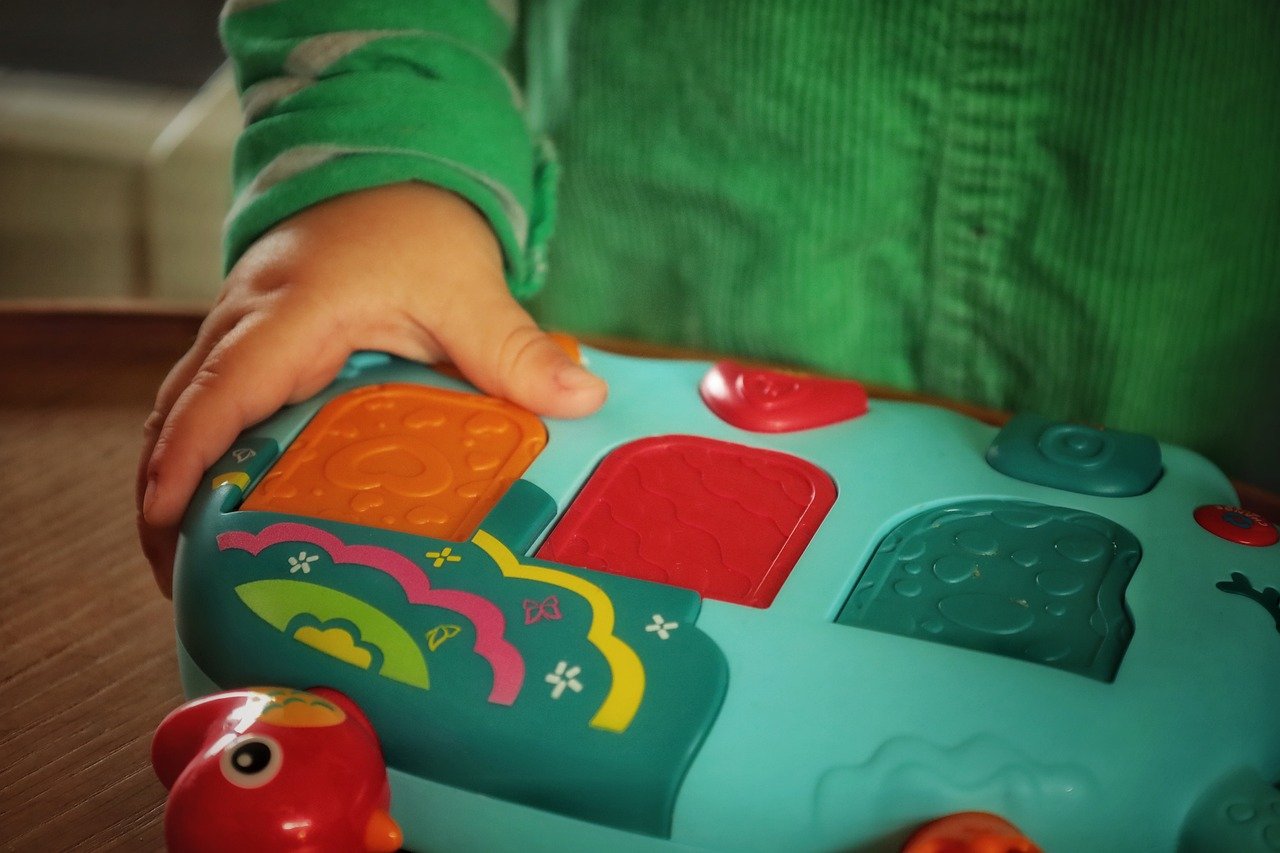
Myth 4: Senior Pets Don't Enjoy Playtime
It's a common misconception that once pets reach their golden years, they lose interest in playtime. However, this couldn't be further from the truth! Just like us, senior pets have their own personalities and preferences, and many still have a playful spirit. Imagine your favorite childhood toy; even if you grew up, you might still find joy in it every now and then. Similarly, senior pets can find joy in play, which is essential for their emotional well-being.
Playtime is not just about physical activity; it's also about bonding and mental stimulation. Engaging in play can help keep their minds sharp and spirits high. Think of it as a way to keep the spark alive in their lives! Whether it's a gentle game of fetch or a cozy cuddle session with a favorite toy, these experiences can significantly enhance their quality of life.
When considering playtime for senior pets, it's crucial to choose activities that cater to their physical capabilities. For instance, while a younger dog might enjoy a vigorous game of chase, a senior dog may prefer a leisurely stroll in the park or a gentle tug-of-war with a soft toy. Here are some tips for creating enjoyable playtime experiences:
- Choose Soft Toys: Opt for toys that are easy on their teeth and gums.
- Gentle Games: Engage in low-impact games that won’t strain their joints.
- Short Sessions: Keep play sessions brief to prevent fatigue.
Additionally, interactive play is a fantastic way to engage your senior pet. Activities like hide-and-seek or puzzle toys can stimulate their minds and provide the mental exercise they need. You might be surprised at how quickly they pick up on these games, showcasing their intelligence and adaptability.
It's also important to observe your pet during playtime. Look for signs of enjoyment, such as wagging tails, playful barks, or even a little dance. If they seem tired or disinterested, it might be time to switch things up or take a break. Remember, the goal is to have fun together while ensuring their comfort and safety.
So, the next time someone tells you that senior pets don’t enjoy playtime, you can confidently debunk that myth! These aging companions still have a lot of love and joy to share, and with the right approach, you can create delightful play experiences that keep their spirits high and their hearts full.
Q: How often should I play with my senior pet?
A: Aim for short play sessions several times a day, adjusting based on your pet's energy levels and preferences.
Q: Are there specific toys that are better for senior pets?
A: Yes, look for soft, lightweight toys that are easy to grasp and gentle on their teeth.
Q: What signs should I look for to know if my pet is enjoying playtime?
A: Signs of enjoyment include wagging tails, playful barks, and an eagerness to engage. If they seem relaxed and happy, you’re on the right track!
Q: Can playtime help with my senior pet's cognitive health?
A: Absolutely! Engaging in play and mental stimulation can help keep their minds sharp and reduce the risk of cognitive decline.
Choosing Appropriate Toys
When it comes to keeping our senior pets engaged and happy, selecting the right toys is crucial. As our furry friends age, their physical abilities and preferences may change, making it essential to choose toys that cater to their specific needs. Not all toys are created equal, and what may have fascinated them in their younger years could now be too challenging or even unsafe. So, how do you find toys that strike the right balance between fun and safety for your aging companion?
First and foremost, consider the size and material of the toys. Senior pets often have weaker jaws and teeth, so opting for softer, more flexible materials can prevent discomfort or injury. Look for toys that are specifically designed for senior pets, as they are usually made from durable yet gentle materials. Additionally, the size of the toy should be appropriate for your pet's breed; a toy that's too small can pose a choking hazard, while one that's too large may be difficult for them to handle.
Another important factor is the type of play your senior pet enjoys. Some pets love to chew, while others prefer to chase or fetch. For those who enjoy chewing, consider plush toys or rubber chew toys that are easy on their teeth. If your pet is more active, look for lightweight balls or soft frisbees that they can easily carry around. You might also want to explore interactive toys that stimulate their minds, such as puzzle toys that dispense treats when solved. These not only provide entertainment but also promote cognitive engagement, which is vital for their mental health.
It’s also a good idea to observe your pet’s behavior with different types of toys. Are they more inclined to cuddle with a soft toy, or do they get excited about chasing after a ball? Understanding their preferences can help you make informed choices. You can even rotate toys to keep things fresh and exciting for them, preventing boredom and encouraging active play.
Lastly, always keep an eye on the toys your senior pet plays with. Regularly inspect them for any signs of wear and tear, and replace them if they become damaged. Safety should be your top priority; after all, the last thing you want is for your beloved companion to accidentally ingest small pieces or get hurt while playing. By choosing appropriate toys that cater to their needs, you’re not just providing entertainment; you’re enhancing their quality of life during their golden years.
- What types of toys are best for senior pets? Soft toys, rubber chew toys, and interactive puzzle toys are great options for senior pets.
- How can I tell if a toy is safe for my pet? Ensure the toy is made from non-toxic materials, is the right size, and has no small parts that could be swallowed.
- Should I supervise playtime with my senior pet? Yes, it's a good practice to supervise your pet during playtime to ensure their safety.
- How often should I replace my pet's toys? Regularly inspect toys for damage and replace them as needed, especially if they show signs of wear.
Interactive Play Ideas
Engaging your senior pet in interactive play is not just a fun way to bond; it’s also a fantastic method to keep them physically active and mentally stimulated. Think of playtime as a mini workout session that also strengthens the emotional connection between you and your furry friend. Here are some creative ideas to get started:
First off, consider using soft, plush toys that are easy for older pets to grasp. These toys can be used for gentle tug-of-war games, which can be a great way to encourage movement without putting too much strain on their joints. Just remember to keep the tugging light and enjoyable—this isn’t a competition!
Another excellent option is to introduce interactive puzzle toys. These toys are designed to challenge your pet’s mind and can be filled with treats or kibble. As your pet nudges, paws, or nudges the toy, they’ll have to figure out how to get the tasty reward inside. This not only keeps them occupied but also helps to stimulate their cognitive functions, which is crucial as they age.
If you have a yard or a safe space outside, consider playing a gentle game of fetch. Use a lightweight ball or frisbee that’s easy for your senior pet to carry. You can even modify the game by rolling the ball instead of throwing it, making it less strenuous for them. The key is to keep the sessions short and sweet, ensuring that your pet doesn’t overexert themselves.
Additionally, hide-and-seek can be a delightful game for senior pets. You can start by hiding treats around the house and encouraging your pet to sniff them out. This taps into their natural instincts and provides both physical and mental exercise. It’s like a treasure hunt that keeps them engaged and excited!
Finally, don’t underestimate the power of gentle massage during playtime. Many senior pets enjoy the soothing touch, which can help alleviate any discomfort they may feel in their joints. While this isn’t a traditional “play” activity, incorporating gentle strokes and rubs can enhance their overall well-being and create a calming atmosphere.
In conclusion, interactive play is essential for the happiness and health of senior pets. By incorporating these fun activities into their daily routine, you can ensure that they remain active, engaged, and joyful in their golden years. Remember, the goal is to create a positive experience that respects their physical limitations while still providing them with the joy of play!
- How often should I play with my senior pet? - Aim for short play sessions several times a day, depending on your pet's energy levels and physical condition.
- What types of toys are best for senior pets? - Soft, lightweight toys that are easy to grasp and interactive puzzle toys are ideal for older pets.
- Can senior pets still enjoy outdoor activities? - Yes, but ensure that the activities are low-impact and suitable for their physical capabilities.
- How can I tell if my senior pet is tired? - Watch for signs like panting, slowing down, or lying down during play, indicating they may need a break.
Frequently Asked Questions
- How often should I take my senior pet to the vet?
It's recommended to take your senior pet to the vet at least twice a year. Regular check-ups can help catch potential health issues early, ensuring your furry friend stays healthy and happy.
- Can older pets still learn new tricks?
Absolutely! Older pets can learn new tricks and commands with patience and positive reinforcement. It might take a bit longer, but the bond you create during training is well worth it.
- What are the signs of cognitive decline in senior pets?
Signs of cognitive decline can include disorientation, changes in sleep patterns, decreased interest in play, and increased anxiety. If you notice these signs, consult your vet for guidance and support.
- Do senior pets require special nutrition?
Yes, senior pets often need a diet that caters to their specific health needs. Look for high-quality food that provides the necessary nutrients to support their aging bodies.
- How much exercise do senior pets need?
Senior pets still need regular exercise, but the type and amount should be tailored to their physical capabilities. Shorter, more frequent walks and gentle playtime can keep them active without overexerting them.
- Can senior pets enjoy playtime?
Definitely! Many senior pets love playtime and social interaction. Engaging them in gentle play can enhance their emotional well-being and keep them active.
- What types of toys are best for senior pets?
When choosing toys for senior pets, look for soft, easy-to-handle options that cater to their physical limitations. Toys that encourage gentle interaction, like plush toys or puzzle feeders, can be great choices.
- How can I keep my senior pet mentally stimulated?
Interactive play, puzzle toys, and gentle training sessions can help keep your senior pet mentally stimulated. These activities not only provide exercise but also strengthen your bond with your furry friend.

